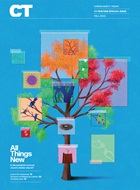
When I went to seminary, I learned just enough about the Holy Spirit to render him irrelevant in my life. I knew enough to confess the Holy Spirit as God, the Lord and giver of life, but I could not discern how the Spirit actually shaped my everyday life. Theologian Heribert Mühlen once warned against falling into an atheism of the Third Person, and sadly, many Christians formally confess the Spirit as God but deny the experience of the Spirit by living as if he is irrelevant.
Over the years, I have heard a recurring question from church members: “What does life in the Spirit look like?” They wonder whether the Spirit’s presence can be grasped only by a few privileged people—academics with graduate degrees in biblical studies or specially anointed spiritual elites who witness extraordinary miracles and transcendent experiences. They are looking for a grammar of the Spirit to help them in their everyday spiritual journeys.
Pastors often speak about spiritual matters ...
1
Support Our Work
Subscribe to CT for less than $4.25/month





















